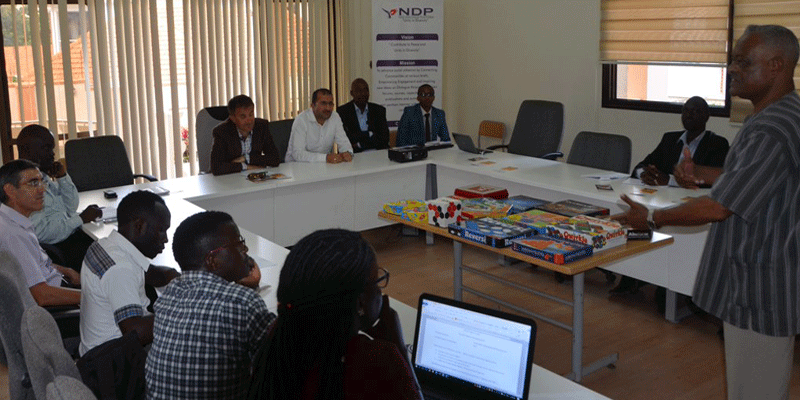
‘
A Peace Creating ToolThe use of sport to promote peace and development is not entirely new.The Olympics are a historic example of sport used for a higher purpose. However, until recently, sport has remained on the sidelines of mainstream humanitarian and development programming, considered a luxury in the context of other development objectives.
Now, there is a growing understanding that sport does not have to compete with other priorities, but can actually be a means for addressing them. Sport encompasses the wide range of needs and interests of individuals and communities around the world, whose desire and ability to participate in sport is influenced by their varied cultural traditions, age, gender, physical ability and other factors.
Every April 6, is the United Nations’ (UN) International Day of Sport for Development and Peace, which recognizes the power of sport in promoting peace and erasing cultural barriers worldwide. Sport also plays a significant role in healthy social development and interaction. It helps people learn how to set and achieve goals through discipline and hard work. It nurtures the development of decision-making and leadership abilities, while teaching people to manage both success and failure.
People who participate in sport have the opportunity to improve their communication skills and gain valuable experience in collaboration and teamwork. Sport brings people together who might not otherwise have a chance to meet and allows them an opportunity to share their experiences and work together toward a common goal. These social skills and experiences are readily transferable to other aspects of life and may improve a person’s ability to succeed as a student, employee, community member or advocate for a particular cause.
Reconciliation and Peace-building
As it is a common language that can bridge cultural, ethnic, and geographic divides, many initiatives use sport to promote the reconciliation of communities or nations in conflict. On this note, the Nile Dialogue Platform, has on a number of occasions organized soccer matches dubbed, Play Soccer, Make Peace”, to promote the interaction of people from different locations. This is done through community-connectors and other stakeholders who are located countrywide.
Sport also has the capacity to transform the lives of individuals. It strengthens physical, psychological, emotional and social well-being and development. At the same time, sport plays a significant role in cultures and communities around the world.
The Transformational Power of Sport
Formal studies indicate that health is one of the evidences that has demonstrated that participation in sport has countless benefits for individuals. Among the most obvious positive outcomes are improvements in physical health, such as weight control, strength building, increased flexibility, enhanced coordination and motor skills, improved cardiovascular health and pain reduction. People who are physically active often tend to develop healthier lifestyles and better eating habits.Some experts around the world have concluded that physical education is a critical component of a child’s overall education. It can improve body awareness and help a child develop healthy habits at an early age.
There is also evidence that participation in physical education improves concentration and performance in academic courses. Furthermore, such classes provide an opportunity to address broader health and safety issues and ensure that all children, including those with disabilities, have an opportunity to participate in sport.
Awareness Raising and Education
One of the most common uses of sport in the development arena is as a forum for conveying educational, public health, safety, environmental or other messages. Sport may also be used to foster individual development and learning. Sporting events may act as a magnet, drawing in people who can then be engaged in education sessions before or after an event.
In some cases, learning and information-sharing are interwoven with sports activities themselves. Celebrity athletes, coaches, teammates or other respected individuals may act as spokespeople to increase the receptiveness of the audience. Sport has an impact on psychological and emotional healing and well-being. Participation in sport can help alleviate depression or anxiety. Physically active people also often experience enhanced self-confidence and improved self-image.
There is also evidence that participation in sport improves concentration and mental functioning. It also provides an alternative to risky or anti-social behavior, creating sufficient structure, discipline, and incentive to keep some people away from drugs, violence or criminal activity.
It is on this note, therefore, that some people who have turned out to be violent and developed extremism tendencies, sometimes indulge themselves most of their time with bad peers who abuse drugs and cause violence in communities. However, most of our youth can use their time by physical participation and interaction in sports.
While sport has an almost unique capacity to bring people together, if not executed with great care, sporting activities sometimes divide or exclude people. Because they have had less exposure to sport, and therefore lack experience or confidence, or because social or cultural stereotypes and assumptions inhibit them, some groups of people are unlikely to participate in sports activities, unless an active effort is made to involve them.
This tends to be especially true of women, girls and persons with disabilities. In many places, ethnic, religious or cultural divisions may also lead to the exclusion of some people from sport. Much work must still be done to bring the sport and development sectors together. Carried out wisely, however, sports programming has the potential to play an important role in fostering development and peace.
Mr. Shafik Waswa is a peace advocate at Nile Dialogue Platform (Uganda)














Sunrise reporter
Leave a Comment
Your email address will not be published.